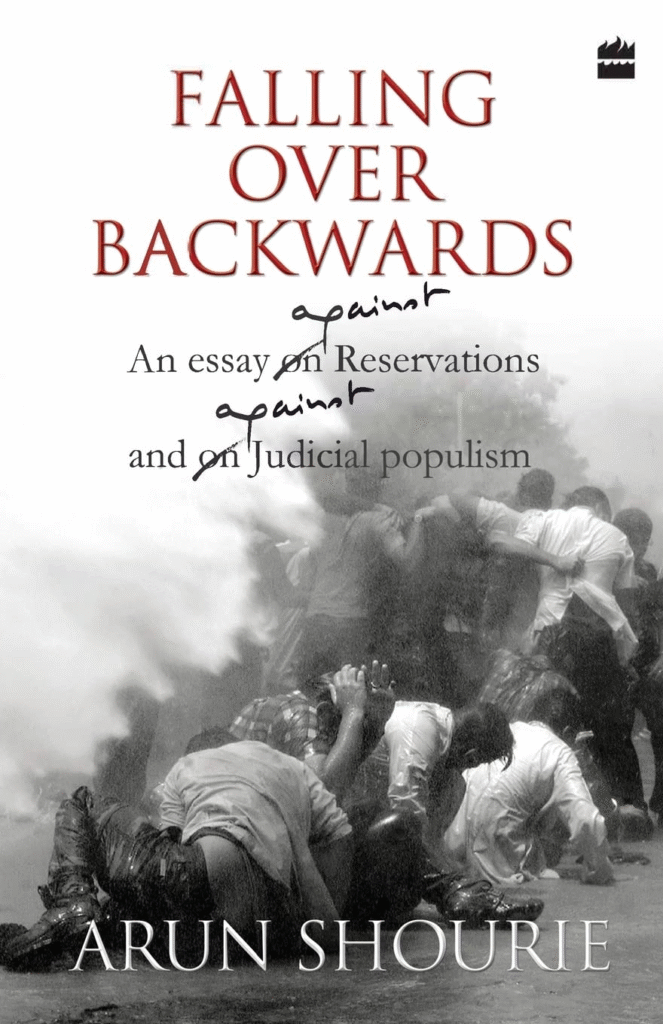Falling Over Backwards (An Essay on Reservations and on Judicial Populism) by Arun Shourie is a thought-provoking exploration of the complex and contentious issue of caste-based reservations in India. With meticulous research and incisive arguments, Shourie critiques the systemic incentives that perpetuate caste divides and questions the effectiveness and implications of reservation policies.
The book delves into historical milestones, such as the Mandal Commission report of 1989, and analyzes judicial interventions, constitutional debates, and political decisions that have shaped the reservation discourse. Falling Over Backwards not only provides a critical examination of the policy’s socio-political consequences but also challenges readers to reconsider its role in modern Indian society.

Packed with data, Supreme Court judgments, and references to constitutional assembly debates, Falling Over Backwards serves as an essential read for students, policymakers, and anyone seeking an in-depth understanding of one of India’s most debated socio-political issues. Arun Shourie’s offers a critical examination of India’s affirmative action policies, particularly focusing on the judicial decisions that have shaped and sustained them. Shourie meticulously analyzes constitutional provisions, historical census data, and court judgments to argue that the current implementation of reservations may inadvertently perpetuate societal divisions rather than ameliorate them. His work challenges readers to reconsider the foundational principles of equality and meritocracy in the context of contemporary Indian society.
Availability and Details of Falling Over Backwards
Falling Over Backwards by Arun Shourie is available in multiple formats, including paperback, Kindle, and hardcover editions. Published by Harper India on 30 October 2012, this book is written in English and spans 524 pages. The paperback edition is priced at ₹584, the Kindle edition at ₹319, and the hardcover edition at ₹1,080. Readers can purchase the book from major online platforms such as Amazon, Goodreads and Flipkart, as well as leading bookstores across India. Its availability in various formats ensures accessibility for diverse reader preferences.
About Author of book
Arun Shourie, born on November 2, 1941, in Jalandhar, Punjab, is an Indian economist, journalist, author, and politician. He completed his schooling at Modern School, Barakhamba, and earned a bachelor’s degree in Economics (Honors) from St. Stephen’s College, Delhi. He further pursued a doctorate in economics from the Maxwell School of Citizenship and Public Affairs at Syracuse University, completing it in 1966.
Shourie began his career as an economist with the World Bank and later served as a consultant to the Planning Commission of India. Transitioning into journalism, he became the editor of prominent Indian newspapers, including the Indian Express and The Times of India. His tenure in journalism was marked by investigative reporting and a commitment to press freedom, earning him the Ramon Magsaysay Award in 1982.
In the political arena, Shourie was a member of the Bharatiya Janata Party (BJP) and served as a Member of Parliament in the Rajya Sabha from 1998 to 2010. He held several ministerial positions in the Vajpayee administration, including Minister of Communications and Information Technology, Minister of Commerce and Industry, and Minister of Development of North Eastern Region.
As an author, Shourie has written extensively on various subjects, including governance, religion, and social issues. His book “Falling Over Backwards: An Essay Against Reservations and Judicial Populism” critically examines the policy of reservations in India, arguing for governance that focuses on individuals rather than interest groups or communities.
Throughout his career, Shourie has been known for his critical views on organized religion and has expressed skepticism about its role in society. His personal experiences, including caring for his son with special needs and his wife’s health challenges, have deeply influenced his perspectives, as reflected in his writings.
Arun Shourie has authored numerous books that have garnered both national and international recognition. Some of his notable works include We Must Have No Price, Where Will All This Take Us?, Harvesting Our Souls, Indian Controversies, The World of Fatwas, A Secular Agenda, and Falling Over Backwards. His literary contributions and achievements have earned him prestigious honors such as the Padma Bhushan and the Dadabhai Naoroji Award.
In recognition of his contributions to literature and public affairs, Shourie was awarded the Padma Bhushan, India’s third-highest civilian award, in 1990.
Arun Shourie’s multifaceted career spans economics, journalism, politics, and writing, marked by a steadfast commitment to individual-centric governance and critical analysis of societal structures.
Themes of Falling Over Backwards
- Historical Evolution of Reservations in India: Arun Shourie traces the origins of caste-based reservations, presenting an in-depth analysis of how this policy was introduced and evolved over time. Falling Over Backwards explores constitutional debates, the historical context of affirmative action, and its intended goals, providing insights into how reservations became deeply rooted in Indian society. Shourie highlights the roles of political and judicial systems in sustaining and expanding these policies.
- Judicial Populism: Impact and Consequences: A key focus of Falling Over Backwards is the phenomenon of judicial populism and its far-reaching effects on India’s reservation policies. Arun Shourie critically examines how the judiciary, in its bid to align with societal and political pressures, has sometimes veered toward populist decisions rather than balanced, merit-based judgments. He highlights instances where landmark judicial rulings have reinforced the reservation system, often amplifying its shortcomings. Through meticulous analysis, Shourie underscores the inconsistencies in judicial reasoning and reflects on how such overreach has influenced India’s socio-political fabric, deepening divides instead of fostering equitable solutions.
- Caste as the Axis of State Policy: The book examines how caste has become the primary axis for the distribution of state benefits in India. Shourie argues that this approach has fostered divisions within society, perpetuating the caste system rather than dismantling it. Through extensive research, Falling Over Backwards critiques the state’s role in incentivizing caste-based identities and deepening social fragmentation.
- Economic and Social Impact of Reservations: Arun Shourie explores the economic and societal ramifications of reservation policies. He emphasizes how such policies often benefit a small section of society while neglecting the broader issues of poverty, inequality, and lack of opportunity. In Falling Over Backwards, Shourie presents data and analysis to argue that reservations have not significantly uplifted marginalized communities, contrary to their intended purpose.
- Critique of the Mandal Commission: The book critically examines the recommendations and implementation of the Mandal Commission report. Shourie delves into the historical and political backdrop of this pivotal moment in India’s reservation policy, highlighting its long-lasting effects on education, employment, and societal harmony. Falling Over Backwards raises questions about the rationale and fairness of expanding reservations based on caste criteria.
- The Political Dynamics of Reservation Policies: In Falling Over Backwards, Arun Shourie discusses how political parties have used reservations to create and sustain divisions among various social groups. Instead of uniting society, he argues that reservations have been used as tools to secure vote banks and perpetuate differences based on caste and community. This has led to social fragmentation and has distracted from addressing the root causes of inequality. Shourie emphasizes the need to question this approach and focus on strategies that genuinely uplift marginalized groups without creating further divides.
- Alarming Future of Caste-Based Reservations: The future of caste-based reservations in India presents significant concerns, as highlighted in Falling Over Backwards. Arun Shourie delves into how the current reservation policies, if left unexamined and unaltered, could lead to unintended and far-reaching consequences. These policies, originally designed to address historical injustices, risk becoming a permanent fixture, fostering divisions rather than unity. Shourie raises concerns about the growing public dissatisfaction, societal polarization, and the looming challenges that these policies pose to India’s unity and development.His analysis emphasizes the need for a balanced approach that addresses inequality while promoting a fair and inclusive system for all citizens.
- Meritocracy Versus Affirmative Action: The book Falling Over Backwards, delves into the debate between meritocracy and affirmative action, analyzing how reservation policies can undermine merit-based systems. Shourie argues that excessive reliance on reservations can dilute the quality of education and governance, raising concerns about India’s global competitiveness and internal development.
- Impact on the Judiciary and Governance: The Falling Over Backwards, highlights how the judiciary has sometimes played a role in enabling the spread of reservations by interpreting laws in ways that align with populist demands. According to Shourie, this trend has diluted the independence of the judiciary and affected the quality of governance. By catering to short-term political goals, the judicial system risks undermining its core purpose of ensuring fairness and justice for all. He stresses the importance of judicial reform to maintain balance and prevent excessive politicization of the system.
- Exhaustive Research and Scholarly Insights: In Falling Over Backwards, Arun Shourie delivers a meticulously researched narrative backed by an impressive collection of judicial verdicts, constitutional excerpts, and historical evidence. The book is a treasure trove of information for readers who wish to understand the complexities of India’s caste and reservation system. Shourie combines data with analysis to highlight the multifaceted impact of reservation policies, providing clarity on how these policies have evolved over time. This scholarly depth makes the book particularly valuable for students, policymakers, and scholars, offering a comprehensive perspective on the intersection of social justice and governance.
- A Call for Re-Evaluation: The central message of Falling Over Backwards revolves around the pressing need to reassess India’s reservation policies. While acknowledging the importance of social justice, Shourie argues that the current reservation system may not effectively address the inequalities it aims to resolve. He suggests shifting towards a more inclusive, merit-based framework that empowers all marginalized groups without perpetuating divisions or compromising quality. By urging for a thoughtful re-evaluation of these policies, Shourie envisions a society that fosters true equity and progress, moving beyond token measures to tackle the roots of social disparity.
By weaving these themes together, Arun Shourie’s Falling Over Backwards: An Essay Against Reservations and Against Judicial Populism offers a comprehensive critique of one of India’s most contentious socio-political issues.
Why You Should Read Falling Over Backwards
Arun Shourie’s Falling Over Backwards is a deeply researched critique of India’s reservation policies and the judiciary’s role in shaping and sustaining them. The book explores the historical origins of caste-based reservations, analyzing how these policies evolved and were influenced by political conveniences. Shourie argues that reservations, in their current form, may perpetuate divisions rather than achieve their intended goal of social equity. His use of constitutional analysis and judicial precedents provides a solid foundation for his case, making the book an insightful resource for those examining the balance between affirmative action and meritocracy.
While the book’s strength lies in its thorough research and bold critique, it does lean heavily toward Shourie’s personal convictions, which may feel repetitive or polemical to some readers. Nevertheless, it offers a thought-provoking exploration of a complex and contentious issue. For anyone interested in the intersection of governance, law, and social justice in India, this book presents a compelling case for reevaluating the approach to reservations and fostering policies that focus on empowering individuals over groups.
Final Thought
Arun Shourie’s Falling Over Backwards: An Essay Against Reservations and Judicial Populism presents a meticulously researched critique of India’s reservation policies and the judiciary’s role in their perpetuation. Drawing from historical records, constitutional amendments, and judicial rulings, Shourie argues for governance that prioritizes individual merit over communal or caste-based considerations. He highlights the fluidity of caste identities during the British Raj, the politicization of reservation policies, and the judiciary’s inconsistent responses to these issues. Shourie contends that such policies, rather than alleviating social disparities, may entrench divisions and hinder genuine progress. The book challenges readers to reconsider the efficacy and ethical implications of reservations, advocating for a system that emphasizes individual capabilities and meritocracy.




